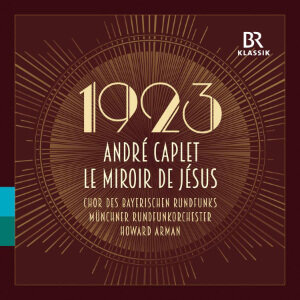
André Caplet (1878-1925)
Le Miroir de Jésus: Mystères du rosaire (1923)
Anke Vondung (mezzo-soprano)
Choir of Bavarian Radio
Munich Radio Orchestra/Howard Arman
rec. live, 4-5 April 2019, Herz-Jesu-Kirche, Munich
Texts and notes in French, German and English
BR Klassik 900342 [60]
André Caplet is a composer whose body of work is not much remembered or performed these days. My only previous encounter with him occurred 10 years ago while attending a performance of his fantasy for orchestra and solo harp based on Poe’s The Masque of the Red Death. Even that performance was in an arrangement of the piece for a string quartet and harp. Caplet was a contemporary of Claude Debussy and counted the more celebrated composer among his friends. Caplet was the winner of the prestigious Prix de Rome competition in 1901. Like so many other composers of his generation, he divided his career between composition and conducting. According to his page on Wikipedia, he served as music director of the Boston Opera company from 1910 to 1914, an eminent position at that time. With the onset of WWI he joined the French army and served through to the end of the war. He was even contracted to train US Army personnel at a special music academy that was set up in post war France because General Pershing had been so impressed by the quality of the French military bands and wanted to import that proficiency back to the US. During the war Caplet’s lungs had been compromised by exposure to mustard gas and after a battle with pleurisy, he died at the young age of 46 in 1925.
Le Miroir de Jésus is probably his most recorded work. I can see that there have been a handful of previous recordings including one on the Chandos and Marco Polo labels (review). This current release derives from a live performance from the Bavarian Radio in 2019. Caplet’s musical language is fairly concise leaning towards an appropriately sombre mood as befits the subject; although there are moments in the glorious mysteries when patches of brilliance do emerge, all the more noticeable because of their lack of frequency. His orchestration is pared to essentials and is generally much lighter in texture than encountered in Debussy. I find Caplet’s style to be of a similar vein to that of his contemporary, Albéric Magnard; another composer whose death was brought about by events during the Great War. On hearing Caplet’s music for the mystery of the Agony in the Garden of Gethsemane, I detect a descending motif in the orchestra which mirrors a very similar one that Debussy used in the vault scene of Pelléas et Mélisande. Throughout the various mysteries that chart Christ’s life, Caplet has provided a choral introduction of exquisite texture, but usually quite brief, sometimes no more than a word or two. The body of the score is sung or recited by the mezzo soprano as she navigates through the poems of Henri Ghéon. These texts are sometimes illustrative but as often as not, they ask questions of the participants within the mysteries. Anke Vondung’s richly firm mezzo rings out confidently in her lengthy passages. She uses shading of her tone and expression with subtlety that responds to the various moods which the score and text demand. Although she is not a native French speaker, her words are sung with clarity and precision. She achieves much in this work, buoyed-up by the luxurious sound that emanates from the Munich Radio Orchestra. The female Choir of the Bavarian Radio do not have a lot to do but their contribution is a spectacular one nonetheless. Howard Arman leads the different elements in this score with proficiency which is important for a score in which the conductor gets very little opportunity to stand out. The sound of this recording is what I have come to expect from BR Klassik, clear and immediate but not neglecting the conveyance of space within the auditorium. A fine achievement all around.
Mike Parr
Help us financially by purchasing from



Previous review: Jonathan Woolf (February 2023)


















